- Home
- Donald Hamilton
The Annihilators
The Annihilators Read online
Contents
Cover
Also by Donald Hamilton
Title Page
Copyright
1
2
3
4
5
6
7
8
9
10
11
12
13
14
15
16
17
18
19
20
21
22
23
24
25
26
27
28
29
30
31
32
33
34
About the Author
Also Available from Titan Books
Also by Donald Hamilton and available from Titan Books
Death of a Citizen
The Wrecking Crew
The Removers
The Silencers
Murderers’ Row
The Ambushers
The Shadowers
The Ravagers
The Devastators
The Betrayers
The Menacers
The Interlopers
The Poisoners
The Intriguers
The Intimidators
The Terminators
The Retaliators
The Terrorizers
The Revengers
The Infiltrators (April 2016)
The Detonators (June 2016)
The Vanishers (August 2016)
The Demolishers (October 2016)
The Annihilators
Print edition ISBN: 9781783299850
E-book edition ISBN: 9781783299867
Published by Titan Books
A division of Titan Publishing Group Ltd
144 Southwark Street, London SE1 0UP
First edition: February 2016
1 2 3 4 5 6 7 8 9 10
This is a work of fiction. Names, characters, places, and incidents either are the product of the author’s imagination or are used fictitiously, and any resemblance to actual persons, living or dead, business establishments, events, or locales is entirely coincidental. The publisher does not have any control over and does not assume any responsibility for author or third-party websites or their content.
Copyright © 1983, 2016 by Donald Hamilton. All rights reserved. Matt Helm® is the registered trademark of Integute AB.
No part of this publication may be reproduced, stored in a retrieval system, or transmitted, in any form or by any means without the prior written permission of the publisher, nor be otherwise circulated in any form of binding or cover other than that in which it is published and without a similar condition being imposed on the subsequent purchaser.
A CIP catalogue record for this title is available from the British Library.
Did you enjoy this book? We love to hear from our readers. Please email us at [email protected] or write to us at Reader Feedback at the above address.
To receive advance information, news, competitions, and exclusive offers online, please sign up for the Titan newsletter on our website: www.titanbooks.com
1
The airlines lost or misplaced a plane in New York, the one that was supposed to take me on to Chicago. It took them four hours to find it, maintaining the breathless suspense by announcing its imminent arrival every half hour. One of these days I’m going to invent a transportation device that runs on rails and call it a railroad. It may not operate on time, either, but at least I won’t have to worry about what made it late that might cause it to fall out of the sky after I’m on board.
During the delay I managed to phone Eleanor Brand at her Chicago apartment and let her know that there was really no way of predicting how long it would take them to get the big bird to flap its wings properly so she’d better not try to meet me at that sprawling insane asylum known as O’Hare Field. I’d just take a taxi up to the Near North Side, as Chicagoans call it, whenever I finally got in.
She said that she’d be waiting with something nice for me to drink, eat, and screw. As a lady reporter—journalist—she didn’t always talk like a lady was supposed to talk. Come to think of it, I never did meet a real lady, even the certified aristocratic variety, who talked like a lady was supposed to talk; supposed to by people who weren’t ladies.
It was past eleven at night when I walked through the door of the building. The doorman knew me by this time, of course; but his attitude still said that, while he wouldn’t presume to approve or disapprove morally, he thought that a bright and attractive young career person like Miss Brand in 504 should have been able to do better for herself than a tall, skinny nonentity like me, occupation unspecified. Well, he had a point. When I got out of the elevator and rang the doorbell, to save myself the trouble of digging out the key she’d given me, nobody answered.
I hadn’t expected that. She’d said she’d be there; and when she said so, she usually was. It was like being in a sports car, caught in the wrong gear by a sudden grade; the temperamental machinery lugged and bucked a bit before I could get it shifted down into the proper working ratio. I mean, I’d just finished a job. I’d left it all behind me, I thought, way over there in Europe. I was tired after the long flight. I was out of the spook business for a while. I was a human being again, well, as human as we ever let ourselves get. All I wanted was to relax and pick up where Elly and I had left off a couple of months earlier in this apartment, when she’d handed me the phone and told me Washington was on the line.
There had been no reproach in her voice. That was part of the unspoken, unwritten deal we had. We had a good time together, a very good time together. Then the phone rang and she had an assignment or I did—in our different fields of endeavor—and we didn’t see each other for a while. So far, for over a year, it had worked quite well on an unofficial (some stuffy people might prefer the word illicit) basis.
It was understood between us that it could go either way eventually. Marriage wasn’t outside the realm of possibility, although we were neither of us particularly good matrimonial material. On the other hand, for the time being, either party was free to terminate the relationship at will, no explanations required, no questions asked. But if she hadn’t wanted me to come to her now, she’d have said so. She wouldn’t have left me standing outside her door fumbling for the key, particularly not after answering the phone with every indication of pleasure at hearing my voice, and after promising to be waiting to welcome me appropriately whenever I managed to get here. I heard the telephone start to ring behind the closed door. Nobody answered it.
I swallowed something in my throat and, having found the elusive key, hesitated, wishing I had a gun—but the airport X-ray machines make a secret agent’s life very difficult these days. It hadn’t seemed worthwhile to have somebody waiting at O’Hare to slip me a weapon, not in a city I was just visiting to see my girl. I told myself not to be paranoid; she was probably just in the bathroom with the water running or in the kitchen with the dishwasher running. But the phone was still ringing in there, nobody was doing anything about it; and you do not disregard the unexpected in my line of work.
I unlocked and opened the door and went through it fast, the way they teach us in the spook-factory-and-repair-shop we maintain out in Arizona, known as the Ranch—although they do keep changing those ballet routines on us from time to time, and I wasn’t quite certain that I was employing the latest, improved door-penetration technique. As it turned out, it didn’t matter, since there was nobody hostile waiting inside. There was nobody waiting inside. The phone had stopped ringing. I picked myself u
p and made my way cautiously into the bedroom and got out the snubnosed .38 Special revolver I’d left with her—for a spare, and because I don’t feel that a woman living alone should be unarmed these violent days, particularly when she has a close friend, if you want to call it that, with as many enemies as I have. I checked the loads: full house.
Then I brought in my suitcase and closed the hall door. The apartment felt very still and empty. I looked through it carefully. It was small and very neat and not particularly feminine; she wasn’t a frilly-curtains girl. The electric typewriter in the corner was tidily covered; and the pages on the table, an article she’d been working on, were precisely stacked, weighted down with an ashtray containing one crushed-out last-minute cigarette. She was a very terrible little person by modern standards; she smoked. The faint residual odor of tobacco did funny things to my throat. I wished to God she were there turning the air blue with her lousy carcinogenic fumes, just so she was there.
Drink materials were set up on the little bar in the living room. There was stuff on the stove in the diminutive kitchen; but all the burners had been turned off and no residual warmth remained. The bathroom was clean, and the big double bed in the single bedroom had been turned back for immediate occupancy, but there was no occupant. I knew a limited sense of relief. It wasn’t too many years ago that I had entered an apartment in another country to find the champagne ready to be popped, the roast ready to be carved, and the lady of the place lying dead by the window in her prettiest negligee.
At least here the clock was still running, or could still be running. I wished I knew how much time was left on it, if any. I could be drawing falsely optimistic conclusions from the lack of blood. Or I could, of course, be jumping to falsely pessimistic conclusions because of Eleanor’s simple absence. In my line of work we do tend to expect the worst, always. I told myself that she could have run out on a last-minute errand and been delayed by some quite innocent and innocuous circumstance. She might come through the door at any moment, flustered and apologetic because she hadn’t been here to greet me. Or she could call to tell me that she was stuck somewhere with a flat tire…
As if in answer to my thought, the telephone started to ring again. I let it jangle three times and picked it up with a small prayer, which was not answered. The voice that spoke in my ear, although feminine, was not Elly’s. It was a younger voice and strongly accented.
“Señor Helm?”
“This is Matthew Helm,” I said.
The girlish voice said, “You are about to have a visitor, señor. You have the reputation of being a hasty man. If you value a certain lady’s life, please restrain yourself. Negotiations are only possible in an atmosphere of restraint. Violence will be met with violence, do you understand?”
“Send in your boy, or girl, señorita,” I said. “Just remember what you said: Violence will be met with violence. And I’ve probably been dealing in that merchandise a hell of a lot longer than you have, whoever you are.”
“We are quite aware of that,” the assured young voice said. “In fact that is why we are approaching you. We require an expert in violence and we have reason to believe that you are the best. The messenger will explain, señor.”
“Give me his name so I can tell the doorman to let him come up.”
“Her name is Dolores Anaya, señor.”
The girl at the other end of the line replaced the telephone gently, severing the connection. I called downstairs; then I sat frowning grimly at the undeserving instrument. Not Cuban, I thought. Not really Mexican, although that was closer. Farther south. Guatemala wasn’t quite right and neither was Colombia; but I’d heard that particular Latin-American accent before, although not that particular voice. But educated, no wetback she. Elly, what the hell have you got yourself into? What have I got you into?
But that was a stupid question. I knew exactly what we were into, and I was coldly aware of the standing orders governing this particular situation. They were not very pleasant orders. But I was given no time to consider how unpleasant they really were. Somebody was knocking on the door.
I went over and let her in. She was of medium height and quite young, perhaps in her early twenties. She could have been even younger. They mature early down there. She was wearing high-heeled shoes, very snug black slacks that were a little wider below than current fashion indicated—flamenco-dancer pants—and a crisp white wedding shirt with a lot of elaborate ruffles. Her long black hair flowed down her back smooth and glossy and unadorned, but there were small silver earrings and a silver bracelet or two. She looked very slim in those black trousers, and not a bit boyish. Her face, with its smooth olive skin, was very pretty; it would be beautiful when she’d done a little more living, if she managed that. But she was going about it the wrong way.
There were big dark eyes that could have been irresistible—until she narrowed them slightly, seeing the gun in my waistband, and let me know that she could turn snake-mean, given the provocation.
“The weapon will not be necessary, señor,” she said coldly. It was the voice I’d heard over the phone, of course; she’d been preparing the way for her own appearance. She must have made the call from a nearby booth to get here so fast. “Lay it aside, please.”
I said, “Go out that door, baby, turn around, come back in, and start over. If I’m the man you want, the violent gent you need, I don’t lay aside my gun for the first little girl who asks.”
She did not like being called “baby,” or being told she was a little girl. Her young face hardened. “We have the señorita!”
It was no time for displays of rage, or even concern. I said, “You’re wasting my time and yours, Miss Anaya. Of course you have the señorita, so what else is new? Speak your piece and stop throwing your weight around.” When she didn’t respond at once, I said, “Just give me the name.”
She frowned quickly. “What?”
“You want somebody killed, right?” I said, watching her. Her eyes flickered, letting me know I’d guessed correctly. I went on: “You’ve swung, you and whoever you’re working for, but you’ve struck out. He’s a tough proposition and you haven’t got anybody on your team who’s good enough, so you picked me. I suppose I should be flattered. So tell me: Who are you and who do you want dead?”
She studied me suspiciously. “Who has talked, señor?”
They’re as bad as certain government agencies, these wild-eyed action groups. They never give you credit for having brains enough to figure out their dirty little secrets. If you know something you shouldn’t, there must have been a leak, and somebody must be punished.
I said irritably, “Hell, I’m in a certain line of work. Sometimes I’m called upon to do a little bodyguarding when the subject is important enough. Sometimes I’m called upon to penetrate to a little intelligence material others have been unable to reach because they weren’t willing to get rough enough or didn’t know how. But those aren’t my normal assignments. I won’t ask how you learned, but you know what they are or you wouldn’t be here. So give me the name and I’ll tell you if I’ll do it for you.”
“You will do it! We have—”
I grimaced. “You have the señorita. You have the señorita. So you have the señorita. It’s something, but it’s not a blank check. I need the name. I need to make a telephone call to find out if that name is available or unavailable. If it’s available, I’ll erase it for you.”
This was-pure distilled bullshit, of course. It’s the one game we never play. Technically I was breaking the rules by even pretending to consider the girl’s demands; but I do have a certain amount of seniority in the outfit, and I thought I’d be forgiven if I went along with these creeps a little way, far enough to find out what we had to deal with.
When Dolores Anaya still stood there frowning, I said sharply: “Do you think this has never happened before? Do you think you’re the first bunch of bloodthirsty characters who ever had the idea of employing a government guy like me for your private purposes,
using a little pressure? Well, you hold something I value. To preserve it, I’m willing to make a deal if I can. It goes like this, señorita: You pick up that phone and let me talk with her so I know for sure you really have her and didn’t hurt her too badly grabbing her. Then you let me make my call. Then I’ll tell you where we stand. Okay?”
2
Costa Verde, I thought, waiting. Not everybody knows what we do for Uncle Sam, particularly not everybody down in Latin America. But certain people in Costa Verde knew because we’d done it for them once—I’d done it for them once—upon request.
There had been a bandit or revolutionary patriot, depending upon your point of view, named Jorge Santos, who’d called himself El Fuerte, The Strong One. He had not been a very nice man, but his unniceness had been, of course, strictly irrelevant. Political affiliations are seldom based on nice or not-nice. El Fuerte’s real mistake was that he’d caused embarrassment to President Avila of Costa Verde and, through President Avila, to certain people in Washington who’d considered Avila to be a stable and friendly influence in the region, although, objectively speaking, he really wasn’t a very nice man, either. So I’d been sent down there with a big rifle to remove this revolutionary annoyance to our good friend President Avila, with the help of a small military detachment commanded by a competent Costa Verde army colonel named Hector Jimenez.
Unfortunately for Washington, it became obvious shortly thereafter that Colonel Jimenez had certain political plans of his own when he used the same accurate rifle, which I had left with him as a token of the friendship between our countries—had it used, actually, since he wasn’t much of a marksman himself—to remove Avila and earn himself a promotion to president, after which he’d shipped the big gun back to me with his thanks…
Dolores Anaya had her connection. She was speaking into the phone. “Oso? Leona here. Let me speak with Lobo.” She waited; then she said, “Lobo? Is it permissible for the man to speak with the woman? He will not proceed without… Bueno.” She extended the instrument to me.
“Elly,” I said. Her voice said something in my ear, but it wasn’t clear. “Elly?”

 The Two-Shoot Gun
The Two-Shoot Gun Mad River
Mad River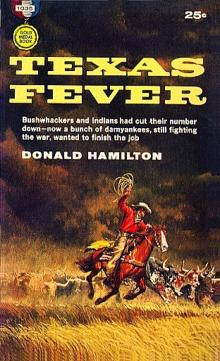 Texas Fever
Texas Fever Ambush at Blanco Canyon
Ambush at Blanco Canyon The Big Country
The Big Country The Wrecking Crew
The Wrecking Crew The Devastators mh-9
The Devastators mh-9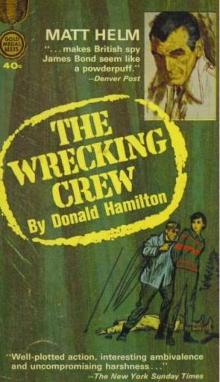 The Wrecking Crew mh-2
The Wrecking Crew mh-2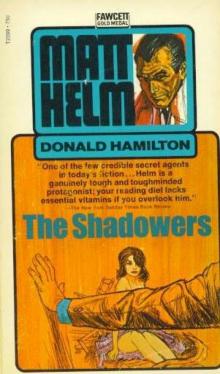 The Shadowers mh-7
The Shadowers mh-7 The Ambushers mh-6
The Ambushers mh-6 The Betrayers
The Betrayers The Terrorizers
The Terrorizers The Poisoners
The Poisoners The Devastators
The Devastators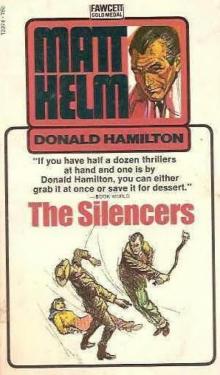 The Silencers mh-5
The Silencers mh-5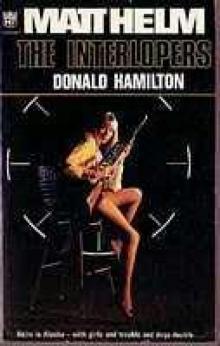 The Interlopers mh-12
The Interlopers mh-12 The Shadowers
The Shadowers The Annihilators
The Annihilators The Vanishers
The Vanishers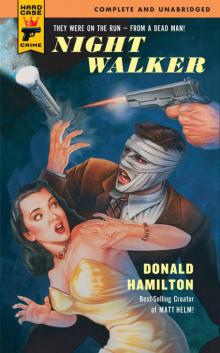 Night Walker
Night Walker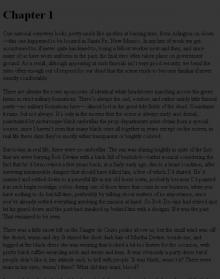 The Revengers
The Revengers The Frighteners
The Frighteners The Infiltrators
The Infiltrators The Intriguers mh-14
The Intriguers mh-14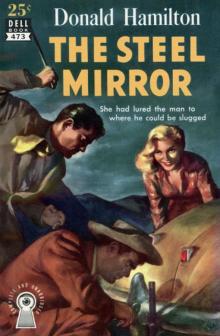 The Steel Mirror
The Steel Mirror The Menacers
The Menacers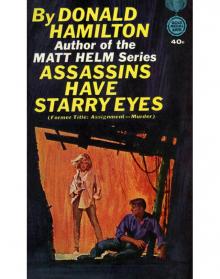 Assassins Have Starry Eyes
Assassins Have Starry Eyes Death of a Citizen
Death of a Citizen Matt Helm--The Interlopers
Matt Helm--The Interlopers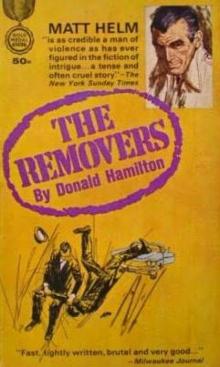 The Removers mh-3
The Removers mh-3 The Demolishers
The Demolishers Murder Twice Told
Murder Twice Told The Poisoners mh-13
The Poisoners mh-13 The Ambushers
The Ambushers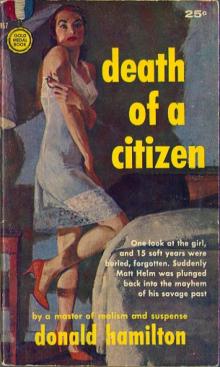 Death of a Citizen mh-1
Death of a Citizen mh-1 The Silencers
The Silencers The Removers
The Removers The Intimidators
The Intimidators The Damagers
The Damagers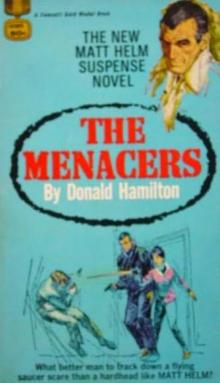 The Menacers mh-11
The Menacers mh-11 The Retaliators
The Retaliators Murderers' Row
Murderers' Row The Ravagers
The Ravagers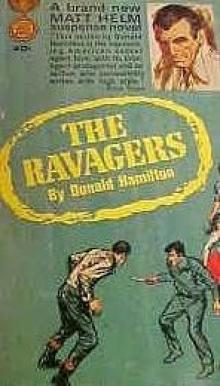 The Ravagers mh-8
The Ravagers mh-8 The Threateners
The Threateners The Betrayers mh-10
The Betrayers mh-10